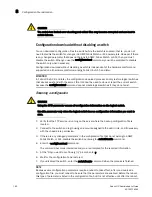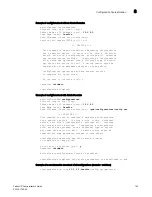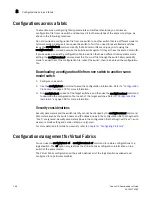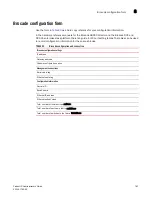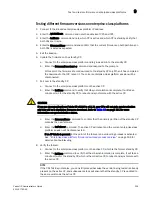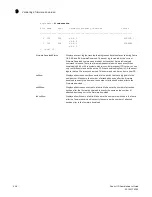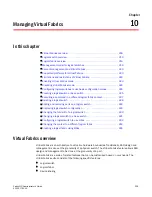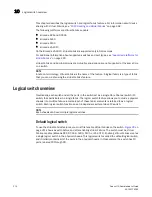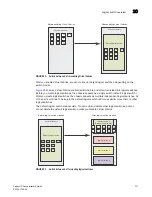
196
Fabric OS Administrator’s Guide
53-1001763-02
Firmware download on an enterprise-class platform
9
This command will cause a warm/non-disruptive boot on the switch,but will
require that existing telnet, secure telnet or SSH sessions be restarted.
Do you want to continue [Y]:
y
Firmware is being downloaded to the switch. This step may take up to 30
minutes.
Firmware download on an enterprise-class platform
You can download firmware to a Brocade 48000, and to a Brocade DCX and DCX-4S
enterprise-class platform without disrupting the overall fabric if the two CP blades are installed and
fully synchronized. Use the haShow command to verify that the CPs are synchronized prior to
beginning the firmware download process. If only one CP blade is inserted or powered on, you can
run firmwareDownload –s to upgrade the CP. If the CPs are not in sync, you can run
firmwareDownload –s on each of the CPs to upgrade them. These operations will be disruptive. Or
if the CPs are not in sync, run the haSyncStart command. If the problem persists, refer to the
Fabric
OS Troubleshooting and Diagnostics Guide
. If the troubleshooting information fails to help resolve
the issue, contact your switch service provider.
NOTE
This section only applies when upgrading from Fabric OS v6.1.x to v6.2.0, or from different versions
of v6.2.0, such as patch releases. If you are downgrading from v6.2.0 to v6.1.x, you must enter the
firmwareDownload –s command as described in
“Test and restore firmware on switches”
on
page 203.
This is not necessary when downgrading from Fabric OS v6.3.0 to v6.2.0 or from Fabric OS v6.4.0
to v6.3.0.
During the upgrade process, the director fails over to its standby CP blade and the IP address for
the enterprise-class platform moves to that CP blade's Ethernet port. This may cause informational
ARP address reassignment messages to appear on other switches in the fabric. This is normal
behavior, because the association between the IP addresses and MAC addresses has changed.
ATTENTION
To successfully download firmware, you must have an active Ethernet connection on each
of the
CPs.
Enterprise-class platform firmware download process overview
The following summary describes the default behavior of the firmwareDownload command (without
options) on a Brocade 48000, a Brocade DCX and DCX-4S enterprise-class platforms. After you
enter the firmwareDownload command on the active CP blade the following actions occur:
1. The standby CP blade downloads firmware.
2. The standby CP blade reboots and comes up with the new Fabric OS.
3. The active CP blade synchronizes its state with the standby CP blade.
4. The active CP blade forces a failover and reboots to become the standby CP blade.
5. The new active CP blade synchronizes its state with the new standby CP blade.
Summary of Contents for 53-1001763-02
Page 1: ...53 1001763 02 13 September 2010 Fabric OS Administrator s Guide Supporting Fabric OS v6 4 0 ...
Page 4: ...iv Fabric OS Administrator s Guide 53 1001763 02 ...
Page 24: ...xxiv Fabric OS Administrator s Guide 53 1001763 02 ...
Page 28: ...xxviii Fabric OS Administrator s Guide 53 1001763 02 ...
Page 32: ...xxxii Fabric OS Administrator s Guide 53 1001763 02 ...
Page 40: ...xl Fabric OS Administrator s Guide 53 1001763 02 ...
Page 42: ...2 Fabric OS Administrator s Guide 53 1001763 02 ...
Page 54: ...14 Fabric OS Administrator s Guide 53 1001763 02 High availability of daemon processes 1 ...
Page 74: ...34 Fabric OS Administrator s Guide 53 1001763 02 Basic connections 2 ...
Page 102: ...62 Fabric OS Administrator s Guide 53 1001763 02 Audit log configuration 3 ...
Page 214: ...174 Fabric OS Administrator s Guide 53 1001763 02 Management interface security 7 ...
Page 228: ...188 Fabric OS Administrator s Guide 53 1001763 02 Brocade configuration form 8 ...
Page 276: ...236 Fabric OS Administrator s Guide 53 1001763 02 Creating a logical fabric using XISLs 10 ...
Page 404: ...364 Fabric OS Administrator s Guide 53 1001763 02 ...
Page 440: ...400 Fabric OS Administrator s Guide 53 1001763 02 Performance data collection 17 ...
Page 480: ...440 Fabric OS Administrator s Guide 53 1001763 02 F_Port masterless trunking 19 ...
Page 494: ...454 Fabric OS Administrator s Guide 53 1001763 02 Buffer credit recovery 20 ...
Page 574: ...534 Fabric OS Administrator s Guide 53 1001763 02 Hexadecimal overview E ...

